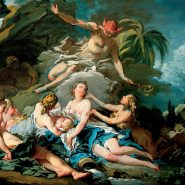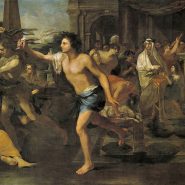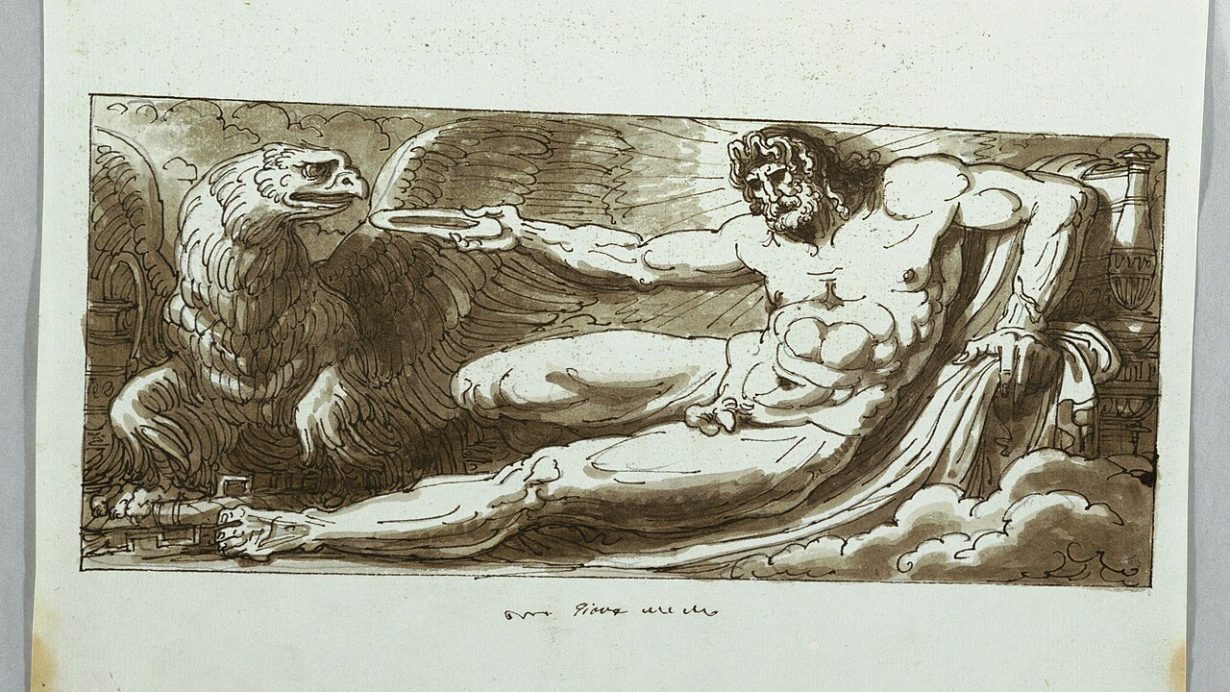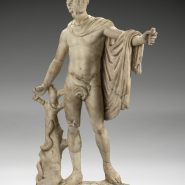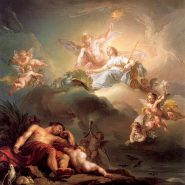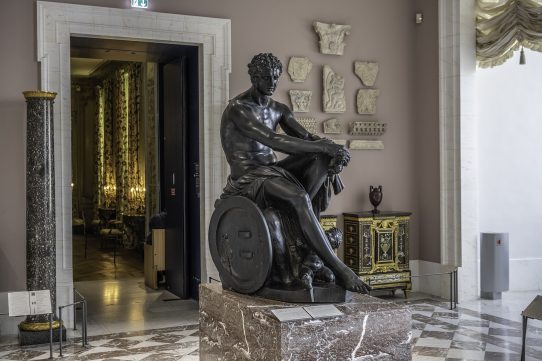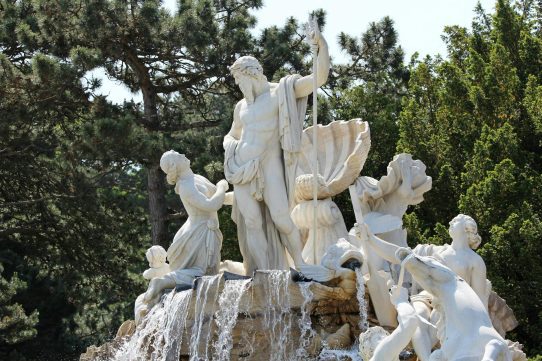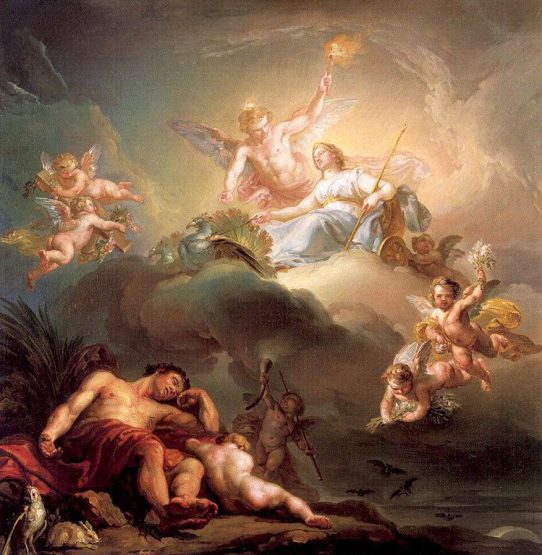Jupiter, the mighty king of the gods, reigned as the supreme deity of Roman mythology — the embodiment of authority, law, and divine justice. He governed the heavens, ruled over storms and thunder, and upheld the moral and political order of the world.
To the Romans, Jupiter was not only the god of power but of principle: the divine protector of oaths, the guarantor of peace, and the eternal guardian of Rome itself. His presence filled both the sky and the state, reminding all that authority, when justly wielded, reflects the will of the divine.
In every triumph and treaty, in every prayer and victory, Jupiter’s name echoed as the highest expression of divine favor and moral duty.
Name and Origin
The name “Jupiter” derives from the Latin Iuppiter or Diespiter, meaning “Father of the Sky” or “Day-Father.” His roots stretch deep into the earliest Italic traditions and the Proto-Indo-European god *Dyeus Pater, the shining sky-father who gave rise to Zeus, Dyaus, and other deities of the heavens.
In Roman belief, Jupiter’s rule was both cosmic and civic — he governed not merely the elements but the fate of nations. Unlike the passionate and personal Zeus of Greek myth, Jupiter was dignified and moral, the god of statesmen, soldiers, and citizens who sought order in the midst of chaos.
His temple crowned the Capitoline Hill, the heart of Rome, where his thunderbolts were believed to strike in defense of justice and truth.
Attributes and Symbols
Jupiter was portrayed as a majestic, bearded god seated upon a throne, holding the thunderbolt — his weapon of divine authority — and the scepter, symbol of lawful rule.
His sacred bird was the eagle, emblem of power and dominion, which later became the standard of Roman legions. The oak tree was his sacred plant, representing endurance and strength. Lightning and clear skies alike were signs of his presence.
Artists depicted him in regal calm, commanding heaven with a glance and thunder with a gesture. Every storm that rolled across the sky was seen as a reminder of his watchful majesty and the balance between mercy and might.
Family and Relationships
Jupiter was the son of Saturn and Ops, the youngest of their six children, born during an age when Saturn devoured each child to prevent a prophesied overthrow.
Hidden at birth by his mother, Jupiter was raised in secret and, when grown, forced Saturn to release his swallowed siblings — Neptune, Pluto, Juno, Ceres, and Vesta. Together, they deposed their father and divided the realms: Jupiter took the heavens, Neptune the sea, and Pluto the underworld. His wife and queen was Juno, goddess of marriage and protector of women, though their union was marked by conflict and passion.
Despite his infidelities with both mortal and divine beings, Jupiter’s authority as father of gods and men remained unchallenged, his offspring — such as Minerva, Mars, and Mercury — forming the divine fabric of Roman religion.
Myths and Stories
Jupiter’s myths reflected his dual nature as both ruler and protector. In early tales, he overthrew his father Saturn, ushering in the new divine order that would govern the world.
As king of heaven, he rewarded loyalty and punished impiety. When men broke sacred oaths or defied justice, Jupiter’s lightning struck as retribution. Yet he could also show compassion. When Numa Pompilius, Rome’s second king, sought divine guidance in establishing religious law, Jupiter appeared to him in dreams, teaching the principles of piety and moderation that would define Roman worship.
Other legends reveal his power over fate and transformation. In one tale, he tested humanity’s virtue by visiting the earth in disguise alongside Mercury. Only the humble couple Philemon and Baucis welcomed the strangers, offering them food and shelter. In gratitude, Jupiter spared their lives from a divine flood and turned their cottage into a temple. The story became a timeless symbol of hospitality and humility — virtues Jupiter rewarded above all.
In another myth, his thunderbolt punished the arrogant King Tullus Hostilius, who performed sacred rites incorrectly, reminding Romans that even rulers were subject to divine law.
Domains and Powers
Jupiter ruled over the sky, storms, law, and authority — both natural and moral. His power governed the balance between gods and men, order and chaos.
As the divine arbiter, he presided over oaths, treaties, and justice, ensuring that integrity upheld the bonds of society. His thunderbolts represented not only wrath but illumination — a flash of divine insight that revealed truth.
In his civic role, he protected the Roman state, the Senate, and the army, granting victory to those who fought with righteousness. His divine will was invoked in every major decision of the republic and empire alike, for to act in Jupiter’s favor was to align with the cosmic order itself.
Philosophy and Moral Influence
Philosophers and poets viewed Jupiter as the embodiment of divine reason — the rational order governing the universe. To the Stoics, he was synonymous with the Logos, the eternal law that guides all things toward harmony. His justice was impartial and his wisdom infinite, representing the ideal of moral leadership. Jupiter’s lightning did not strike in anger alone but as correction, restoring balance when mortals strayed from virtue. His role as lawgiver inspired Roman ideals of justice and governance, teaching that power without righteousness leads to ruin. To honor Jupiter was to honor conscience, duty, and the moral strength that sustains civilization.
Temples and Worship
The worship of Jupiter formed the cornerstone of Roman religion. His grandest temple, the Temple of Jupiter Optimus Maximus (“Jupiter Best and Greatest”), stood atop the Capitoline Hill and served as the spiritual heart of the empire. Within its walls, consuls and generals offered sacrifices before departing for war, and victorious commanders returned to dedicate their triumphs.
His festivals, such as the Ludi Romani, combined athletic games, theater, and offerings of oxen in his honor. Ordinary citizens prayed to him for fair weather, prosperity, and justice, while the Senate sought his favor in state affairs. No treaty, oath, or coronation occurred without his blessing. His priest, the Flamen Dialis, was among the highest in rank, bound by sacred purity to serve only Jupiter’s rites. Through him, Rome maintained its covenant with heaven.
Legacy and Cultural Influence
Jupiter’s influence endured far beyond antiquity. His image — bearded, majestic, enthroned — became the archetype of divine kingship in art and theology.
The English word “jovial” derives from his name, reflecting the optimism and grandeur associated with his spirit. The planet Jupiter, largest and brightest in the solar system, carries his name as a celestial reminder of his dominion over the skies.
In the Renaissance, he reemerged as the symbol of wisdom and authority, a divine lawgiver in the heavens.
Through Jupiter, the Romans expressed their highest vision of order: that justice, not fear, binds gods and men, and that divine power serves the common good.
Unique Traditions and Notes
Roman generals offered white oxen to Jupiter before battle, their horns gilded as tokens of purity.
His festivals included the Ides of every month, when prayers and sacrifices renewed Rome’s divine favor. The eagle standard carried by Roman legions was not merely a military emblem but a living symbol of Jupiter’s presence in war. When lightning struck the ground, the site became sacred, marked as a fulgur conditum — a spot touched by the god’s will.
Through centuries of empire and decline, Jupiter remained the eternal guardian of Rome’s destiny, his thunder echoing in the hearts of all who sought truth and justice.
Adapted from public-domain materials, including Project Gutenberg and Wikisource.
